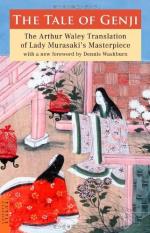|
This section contains 484 words (approx. 2 pages at 400 words per page) |

|
Ever since its birth, The Tale of Genji has been almost universally applauded by literary critics and readers, with some exceptions. Medieval writers deemed it inferior because prose was considered a feminine form. Japanese purists into the 20th century have lambasted the novel's decadence as immoral.
Donald Keene, in Seeds of the Heart, points to the oldest work of criticism of Japanese fiction as an indication of early praise. Mumyo Zoshi (Story Without a Name, c. 1200) is cast in the form of conversation among various literary ladies about their favorite books. They all take it for granted that The Tale of Genji is the supreme work of fiction. One of them says, "The more I think of it, the more I am convinced that to have created this Tale of Genji was such an extraordinary achievement it could not have been accomplished without divine aid. I...
|
This section contains 484 words (approx. 2 pages at 400 words per page) |

|




